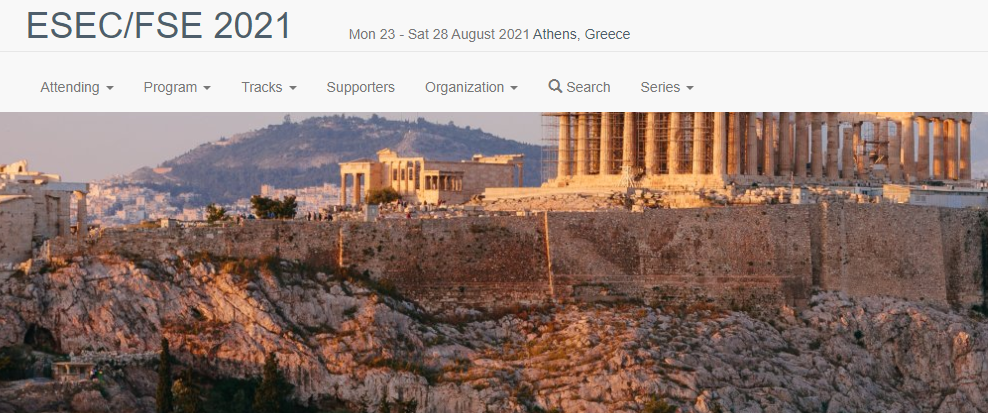
Recently, the organizing committee of ESEC/FSE'21, a top conference in software engineering, announced the list of ACM SIGSOFT Distinguished Paper Awards at the conference, and three papers participated by the Department of Computer Science and Technology of Peking University won awards. ACM SIGSOFT Distinguished Paper Award is a paper award established by ACM SIGSOFT to reward the best papers in no more than 10% of top software engineering conferences. A total of 8 papers were awarded at this conference, and 38% of all winning papers were awarded from Peking University.
"SmartCommit: A Graph-based Interactive Assistant for Activity-Oriented Commits" presents an interactive code submission methodology. In crowdsourced software development, "code commits for development activities" is a widely recognized best practice. However, in real-world software development, developers rarely adhere to this best practice and instead often package code changes that mix multiple development activities together and commit. There are two reasons for this phenomenon: 1. Developers face heavy development tasks and do not have time to care about the cohesion of code submissions; 2. Lack of effective tools to break down miscellaneous code changes. In order to facilitate code submission for development activities, this paper proposes an interactive code change decomposition method based on graph segmentation. This method transforms the code change decomposition problem into a graph segmentation problem and designs a simple human-computer interaction mechanism to absorb the knowledge and experience of developers into the code change decomposition activity in real-time. This method was used in practice for nine months in several internal software development projects involving nearly 100 developers. The data show that this method effectively promotes the implementation of the best practice of "code submission for development activities" under the acceptable interaction cost and time cost. The first author of the paper is Shen Bo, a doctoral student at Peking University, Associate Professor Zhang Wei and Professor Jin Zhi of Peking University are the main supervisors, and other authors include Professor Christian Kaestner of Carnegie Mellon University, Associate Professor Zhao Haiyan of Peking University, Wei Zhao and Liang Guangtai of Huawei.
"VET: Identifying and Avoiding UI Exploration Tartits" proposes a new type of user interface testing technique. Fully automated testing based on user interface (UI) is an effective means to ensure the quality of mobile applications, which can overcome the high cost of manual testing and the low generality of script testing. In about 10 years, many related tools have been proposed in academia, but experiments have shown that the testing effect of these tools on complex industrial-grade mobile applications still has a lot of room for improvement. Different from the previous practice of designing new exploration strategies, this paper proposes a practical way to enhance existing tools, which can automatically find and fix any inefficient exploration problems of existing tools during testing. Experiments have shown that even the latest research-based tools can waste 98% of testing time during testing due to inefficient exploration; At the same time, this method can bring up to twice the effect of existing tools on popular industrial-grade mobile applications, further promoting the practicality of fully automated UI testing in the development of mobile applications in the industry. The first author of the paper is Wang Wenyu, a doctoral student at the University of Illinois at Urbana-Champaign supervised by Professor Xie Tao of Peking University, the corresponding author is Professor Xie Tao of Peking University, and other authors include Assistant Professor Wei Yang of the University of Texas at Dallas (his doctoral supervisor is Professor Xie Tao), Assistant Professor Tianyin Xu of the University of Illinois at Urbana-Champaign.
"Probabilistic Delta Debugging" proposes a new and differentiated debugging technique. Differentiated debugging is one of the basic automatic debugging methods, and its efficiency and effect are the primary factors that restrict the application scope of differentiated debugging for a long time. The improvement of the two is also very difficult: although thousands of papers have been written on differentiated debugging, the DDMIN algorithm proposed about 20 years ago is still at the core of almost all modern differentiated debugging algorithms. This paper probabilistic modeling of differentiated debugging problems, and proposes a method of updating the probability model according to the test results and optimizing sampling according to the probability model, forming a new probabilistic differentiation debugging method ProbDD. Experiments show that ProbDD has about 2 times higher efficiency and effect than ddmin. Since ddmin is the core of almost all modern differentiated debugging algorithms, by replacing ddmin with ProbDD, the results of this study are expected to comprehensively improve the efficiency and effectiveness of modern differentiated debugging. The first authors of the paper are Wang Guancheng, a doctoral student at Peking University, and Ruobing Shen, an undergraduate student, the corresponding author is Associate Professor Yingfei Xiong of Peking University, and other authors include Associate Professor Chen Junjie of Tianjin University (19 years PhD graduate of Peking University), Professor Zhang Lu of Peking University, etc.
In addition, the paper "A Syntax-Guided Edit Decoder for Neural Program Repair", written by Zhu Qihao, a doctoral student at Peking University, and Yingfei Xiong, an associate professor of Peking University, as the corresponding author, was also nominated for the ACM SIGSOFT Distinguished Paper Award.
